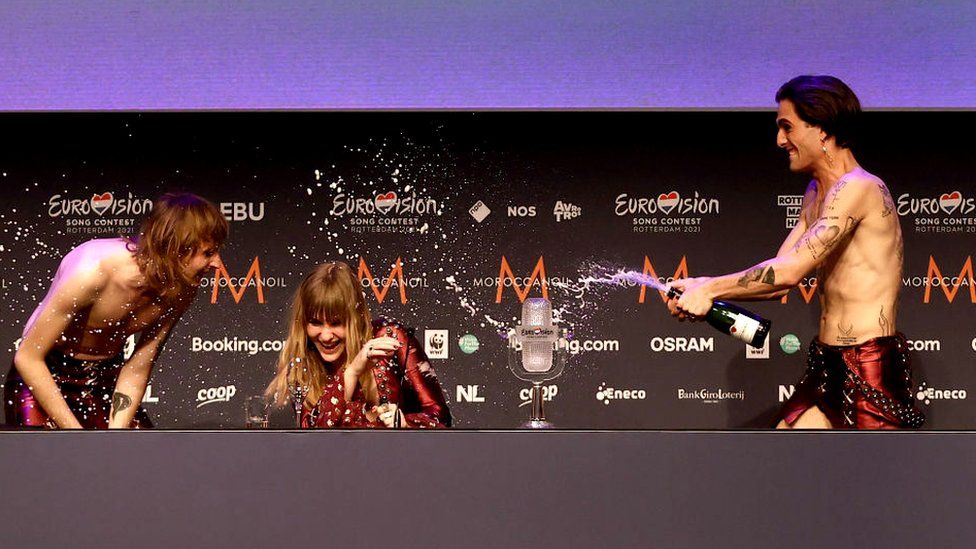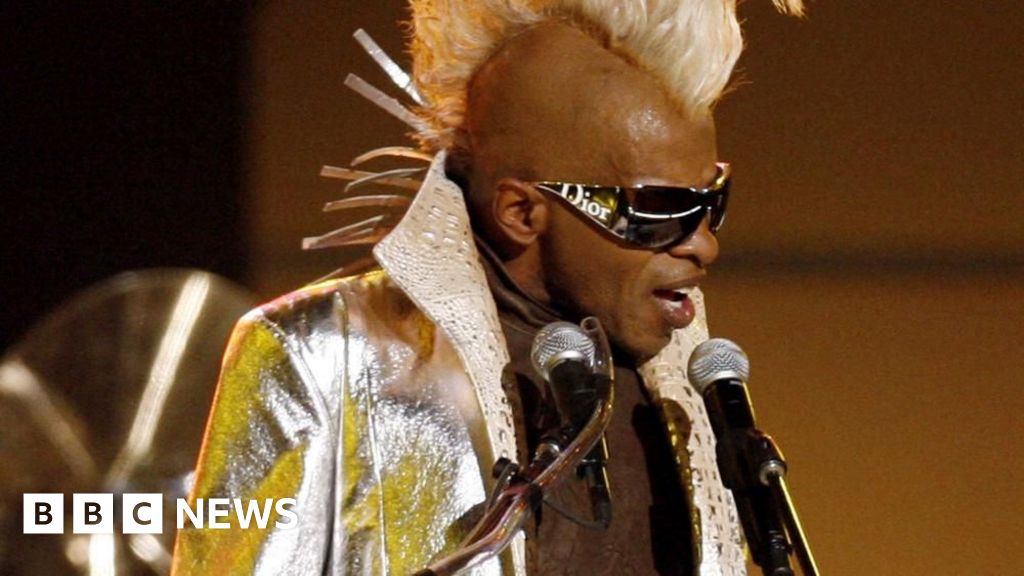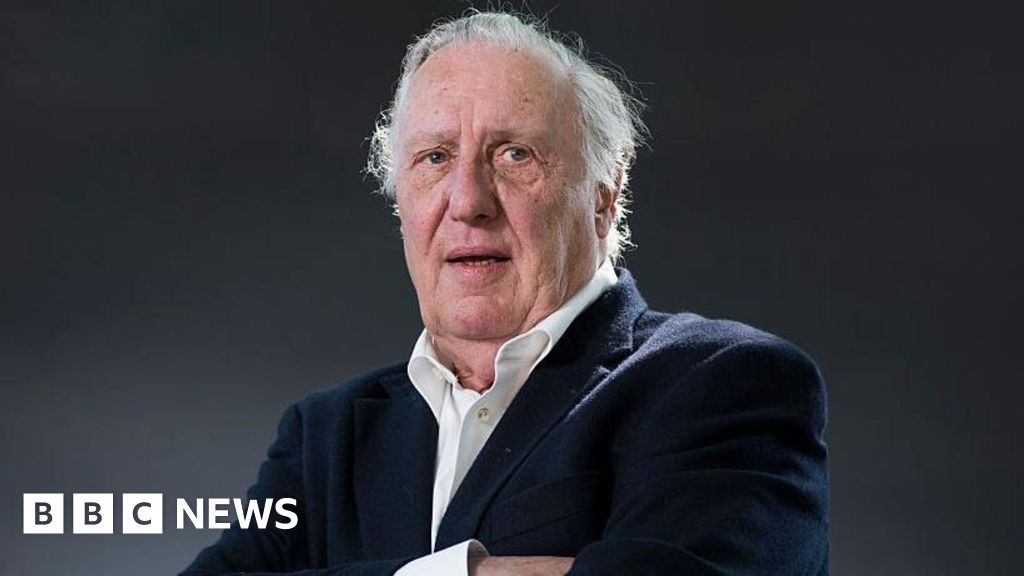ARTICLE AD BOX
 Image source, Getty Images
Image source, Getty Images
The band celebrated their 2021 Eurovision win with a champagne shower
By Mark Savage
BBC Music Correspondent
When Italian sleaze-rock band Måneskin won the Eurovision Song Contest in 2021, an image went around the world of frontman Damiano David spraying his bandmates with champagne.
He was later investigated, and cleared, of taking drugs during the live show - an incident that irritated the band, while solidifying their credentials as rock rebels.
"I got a bit angry about it but actually it was very, very funny," David later said. "It was also like free advertising."
The irony is that David has actually been teetotal for two years.
Guitarist Thomas Raggi jokes that his bandmate usually goes to bed "at 11pm with his chamomile tea".
"I don't drink alcohol because I just don't like it," David tells the BBC.
But the charismatic frontman took a temporary break from sobriety while Måneskin recorded their new album, Rush.
They were recording a song called Kool Kids, "a huge middle finger" to their critics, whose lyrics drip with scornful sarcasm: "I am scum, real scum, but I'm good at this".
"We wanted to make it super-gritty and to sound like a bar anthem," explains David. "So I got drunk on purpose and I shouted as hard as I can."
In his drunken state, the singer gained what can only be described as a London accent, turning him into an Italianate version of Johnny Rotten.
"I was in this punk state of mind," he says, adding that British voices generally sound "more aggressive" than his native tongue.
"Sorry, UK!" he laughs, "but also, it was hard to pronounce the words because my mouth was very high on things."
Image source, Getty Images
Image caption,The band have been nominated for two awards at this year's Grammys
Kool Kids has been a highlight of the band's live shows in the run-up to the release of Rush, and contains what might be considered the Måneskin manifesto (Månefesto?)
"We're not punk, we're not pop, we're just music freaks."
"We are, of course, a guitar band," says David. "A power trio with a singer. But we're not just that and we don't want to be labelled as that because it closes our perspectives.
"We like being influenced by other music and we like being inspired. And we'd like things to constantly change and evolve."
Rush delivers on that promise. Whittled down from the 60 songs they've recorded since Eurovision, it spans multiple genres, from the glam slam stomp of Baby Said and the frenetic rap-rock of La Fine, to the genuinely touching ballad If Not For You.
Warning: Third party content may contain adverts
On Gasoline, they take aim at Vladimir Putin's invasion of Ukraine, as David snarls: "The whole world is waiting for you to go down".
Then, on Bla Bla Bla, the singer taunts his critics with droll ennui: "You said I'm ugly and my band sucks/But I just got a billion streaming song/So kiss my bu-bu-bu-bu-bu-bu-butt."
"That song kind of reminds me of Britpop [during] Blur's Parklife period," he laughs. "I love that side of us - this very ironic, British kind of comedy."
With its host of expensive producers and co-writers - including Max Martin (Taylor Swift, Britney Spears), Savan Kotecha (Lizzo, Katy Perry) and Sarah Hudson (Dua Lipa, Camila Cabello) - Rush is an unashamed grasp for stadium rock status.
It's also the album that, ultimately, will decide Måneskin's fate.
After emerging as runners-up on Italian X Factor in 2017, Eurovision gave them a global platform - but by a strange twist of fate, their biggest hit wasn't their winning song, Zitti e buoni. Instead, it was a four-year-old cover of The Four Seasons' Beggin', which exploded on TikTok and gave the band a US top 10 hit.
The new material will test whether the fans who streamed that track are willing to stick around for their original material.
Image source, Getty Images
Image caption,Måneskin (clockwise from top left): Thomas Raggi, Damiano David, Victoria De Angelis and Ethan Torchio
So far, the signs are good. The band have racked up more than 6.5 billion streams and received a best new artist nomination for next month's Grammys; while critics have given Rush a warm reception.
The NME called the album "an astonishing accomplishment", Uncut said it "thrums with attitude" and Kerrang praised the band's "fiery eccentricity and youthful exuberance" (all four members are aged between 21 and 23).
But for all their ambition, the quartet have found success complicated and confounding.
Last year, they told the BBC they'd only slept in their own beds 10 times in 12 months; and David's new lyrics frequently reference the alienating effects of fame.
Supermodel is populated with superficial, cocaine-fuelled hangers on, and Gossip is a withering portrayal of LA as a "city of lies" where "you just see the surface".
Warning: Third party content may contain adverts
On Timezone, the singer pines for his girlfriend while he's stranded on a tour bus, 7,000 miles away. Later, he confides in her: "If not for you, I wouldn't sing any more."
"The dark side of stardom has to be told because people don't really know how how hard it is," he says.
"This kind of life, it's very fast and it's always rushing," adds drummer Ethan Torchio. "We've had to learn what to do if something is not fair, or it doesn't feel good."
"And sometimes it's very hard to say no to things," David continues, "but lately, we're talking more about it between us, and we're getting better."
"I will say also that, especially in the last two years, we've done lots of amazing things and it felt weird saying no, because we grew up dreaming of these opportunities," rationalises guitarist Thomas Raggi.
Among the band's highlights are recording with Iggy Pop and supporting the Rolling Stones on tour.
"Mick Jagger was like a walking statue. It didn't seem real," says David. "He is so young, his skin is so beautiful. He's flawless.
"He gave me hope to become an old rock star. A really happy, old rock star."
Image source, Tommaso Ottomano
Image caption,The band will launch their third album with an intimate London show on Sunday, 22 January
Like the Stones, Måneskin enjoy provoking their audience (or, more likely, their audience's parents). Their songs continually reference sex and submission, drug use and even erectile dysfunction.
"These things exist and ignoring them is not going to make it disappear," protests David.
"Singing about it helps to normalise it - and when you normalise something, it's even easier to see if it's a bad thing or a good thing or just... a thing."
He notes that fans respond to those songs differently, depending on where they play.
"In countries where it's more open, you can feel that its more open," he says. "And in a country where it's not, there's a feeling of, 'Yes! Finally, I can express myself.'"
For all the outrageous outfits and sexually-charged lyrics, Maneskin are, at heart, a tight-knit gang of friends. There's a telepathic synchronicity on stage and a tangible intimacy to their interactions, that can only be rooted in deep, personal chemistry.
"We're not just friends or colleagues, we're something more," says Raggi. "We have to share the songs together, so there's a very important connection, inside of ourselves."
"We see each other more than our blood families," agrees David. "But it's also larger than the four of us. There's 20 people that follow us all around the world, who work just as hard, but don't go on stage or on TV.
"It's like we've created this huge southern Italian family."

 2 years ago
60
2 years ago
60








 English (US) ·
English (US) ·